The Canadian Hydrogen Intensity Mapping Experiment fast radio burst (CHIME/FRB) team, which discovered more than 500 new fast radio bursts in the first year of the detector’s operations, will receive the 2022 Lancelot M. Berkeley − New York Community Trust Prize for Meritorious Work in Astronomy.
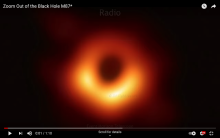
In April 2019, scientists released the first image of a black hole in the galaxy M87 using the Event Horizon Telescope (EHT). However, that remarkable achievement was just the beginning of the science story to be told. McGill University astronomers were part of this global effort.
Data from 19 observatories are now being released that promise to give unparalleled insight into this black hole and the system it powers, and to improve tests of Einstein’s General Theory of Relativity.
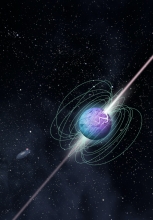
New data from a Canadian-led team of astronomers, including researchers from the McGill Space Institute and McGill University Department of Physics, strongly suggest that magnetars - a type of neutron star believed to have an extremely powerful magnetic field - could be the source of some fast radio bursts (FRBs). Though much research has been done to explain the mysterious phenomenon, their source has thus far remained elusive and the subject of some debate.

McGill team awarded contract to advance potential Canadian contribution for LiteBIRD space telescope
November 7, 2019 (MONTREAL, Quebec) - A team of researchers from the McGill Space Institute has secured a Phase 0 contract with the Canadian Space Agency (CSA) to advance a proposed Canadian contribution – including technology deliverables and scientific know-how -- for the LiteBIRD (Light satellite for the studies of B-mode polarization and Inflation from cosmic background Radiation Detection) mission.

The afterglow from the distant neutron-star merger detected last August has continued to brighten – much to the surprise of astrophysicists studying the aftermath of the massive collision that took place about 138 million light years away and sent gravitational waves rippling through the universe.
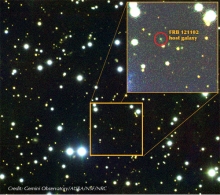
Astronomers have pinpointed for the first time the home galaxy of a Fast Radio Burst, moving scientists a step closer to detecting what causes these powerful but fleeting pulses of radio waves. FRBs, which last just a few thousandths of a second, have puzzled astrophysicists since their discovery a decade ago.

By Chris Chipello, McGill Newsroom
McGill researchers Elena Bennett and Yasser Gidi also honoured by NSERC
The Natural Sciences and Engineering Research Council of Canada (NSERC) has named McGill University astrophysicist Vicky Kaspi as this year’s recipient of the Gerhard Herzberg Canada Gold Medal for Science and Engineering, NSERC’s highest honour, in recognition of the excellence and influence of her research contributions.
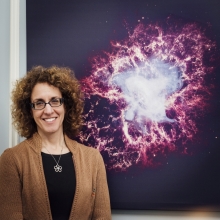
Victoria Kaspi, a professor and Canada research chair at McGill University, is this year's winner of the $1 million Gerhard Herzberg Canada Gold Medal from the Natural Sciences and Engineering Research Council of Canada. The award has been awarded annually since 1991 to recognize "sustained excellence and overall influence" of research conducted in Canada.
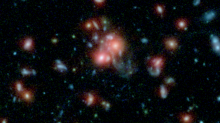
"Usually, the stars at the centers of galaxy clusters are old and dead, essentially fossils," said Tracy Webb of McGill University, Montreal, Canada, lead author of a new paper on the findings accepted for publication in the Astrophysical Journal. "But we think the giant galaxy at the center of this cluster is furiously making new stars after merging with a smaller galaxy."

McGill professor Vicky Kaspi, a world-renowned astrophysicist known for her cutting-edge work on neutron stars and pulsars, was awarded the Killam Prize today, one of the country’s most prestigious awards for academic-career achievement. The $100,000 prize was granted for outstanding scholarship in the natural sciences. Five awards – one each in the categories of the humanities, social sciences, natural sciences, health sciences and engineering -- are distributed every year by the Canada Council for the Arts.

Brief pulse detected by Arecibo telescope appears to come from far beyond our galaxy
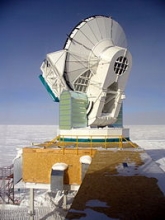

Observations with the Atacama Large Millimeter/submillimeter Array (ALMA) show that the most vigorous bursts of star birth in the cosmos took place much earlier than previously thought. The results are published in a set of papers to appear in the journal Nature and in the Astrophysical Journal. The research is the most recent example of the discoveries coming from the new international ALMA observatory, which celebrates its inauguration today.
